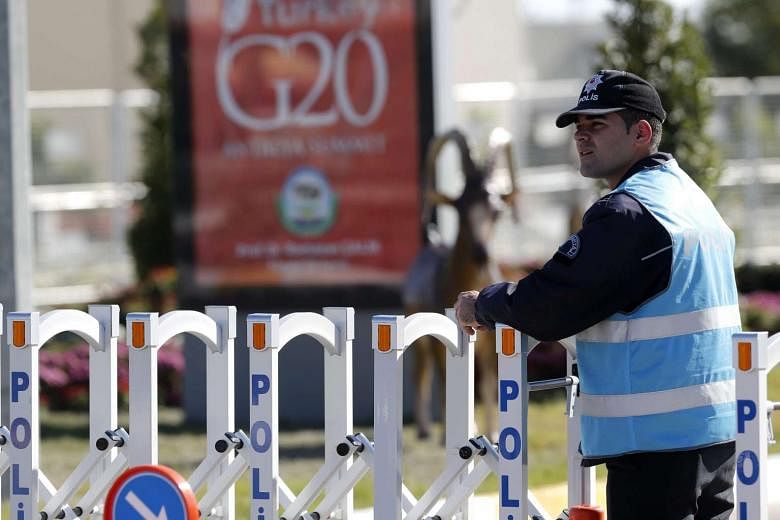ISTANBUL • The Turkish coastal resort of Antalya plays host to the Group of 20 summit from tomorrow, and puts world leaders next door to one of the biggest crises on their plate.
The G-20's mandate is to foster economic and financial stability and the Turkish government's agenda for the 2015 presidency refers to "strengthening the global recovery" and enhancing market regulation, energy policy and efforts against climate change.
Yet for many leaders attending, the summit will be dominated by the war in Syria and the outflow of humanity arriving on European shores via Turkey.
Antalya is almost equidistant from the part of the Aegean Sea where Syrians are drowning as they seek safety and the territory held by the Islamic State in Iraq and Syria (ISIS).
In the run-up to the summit, the Turkish authorities have deployed extra police in the city and raided the homes of suspected militants and their supporters.
Here are a few things worth watching for at the two-day meeting:
• The Obama-Putin dynamic
It has been less than two months since the pair met in New York to discuss the Syrian civil war.
Unknown to United States President Barack Obama, his Russian counterpart Vladimir Putin was planning the country's biggest military campaign outside the former Soviet Union in more than two decades, sending his war planes in late September to prop up Syrian President Bashar al-Assad.
At last year's G-20 summit in Brisbane, Australia, President Putin left early after being chastised over the conflict in Ukraine and threatened with more sanctions.
This time, he arrives as someone Mr Obama and his allies are more likely to deal with. The latest Russian plan, being discussed in Vienna this weekend, is a political transition in Syria lasting as long as 18 months.
• Angela Merkel and the Syrian refugee drama
The German Chancellor has been under fire from members of her own caucus for her open-door policy.
Dr Merkel needs Turkish President Recep Tayyip Erdogan, emboldened by the party he founded winning back its parliamentary majority, to do more to staunch the flow through his country of not just Syrians, but also migrants from countries including Afghanistan and Bangladesh.
The two met last month in Istanbul, where Dr Merkel dangled the prospect of cash and closer ties with the European Union in return for help with the migrants.
As he fights Kurdish separatists and ISIS militants, Mr Erdogan will be keen to show that he is the man everyone needs to do business with as the traditional Turkish bridge between the East and the West.
• The economy
When it comes to keeping to the G-20 script, the state of the world economy will hardly provide any respite.
Only this week, the Organisation for Economic Cooperation and Development in Paris lowered its global growth forecast for the second time in three months.
Chinese President Xi Jinping arrives after a slowdown at home that rippled through financial markets this year, while Argentina is on the cusp of a meltdown ahead of a Nov 22 presidential election run-off.
The Saudi King may reflect on having to adjust to oil prices remaining below US$50 a barrel. Then there's Brazil, where President Dilma Rousseff is clinging to power while trying to navigate a deepening recession and rampant inflation.
One subject for discussion keenly watched by investors is the status of China's yuan as an International Monetary Fund reserve currency, known as Special Drawing Rights, and how this may affect its value. Turkey has urged support for China's inclusion.
BLOOMBERG

